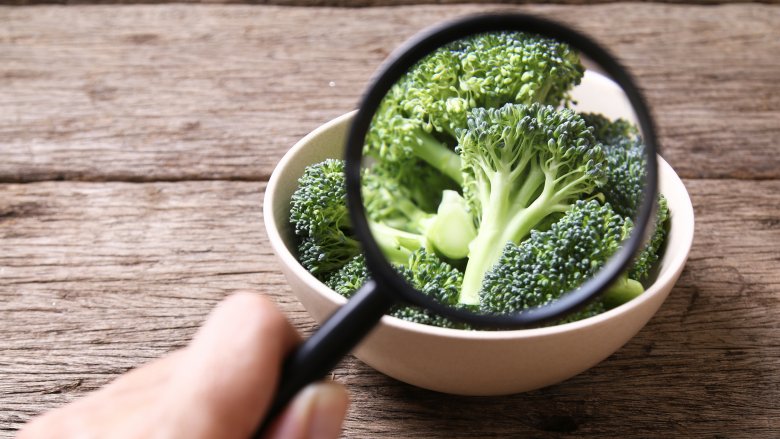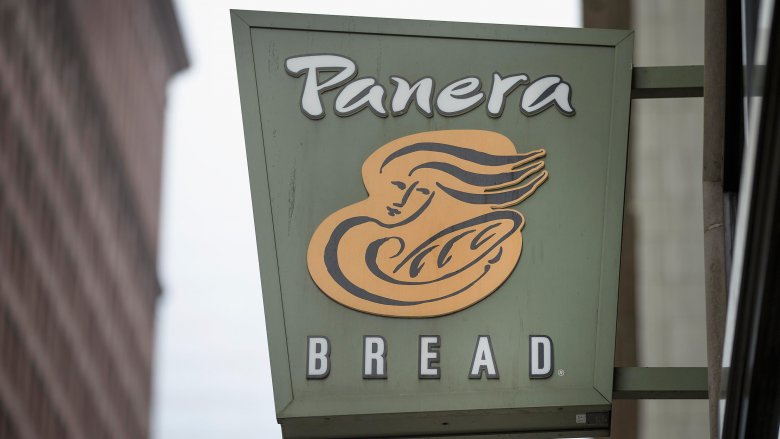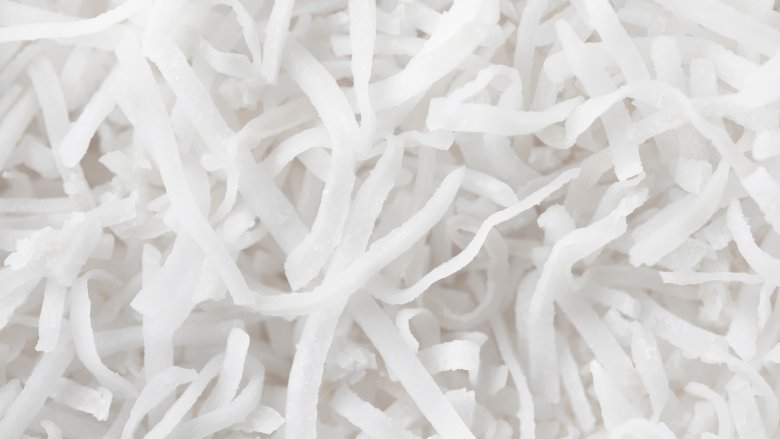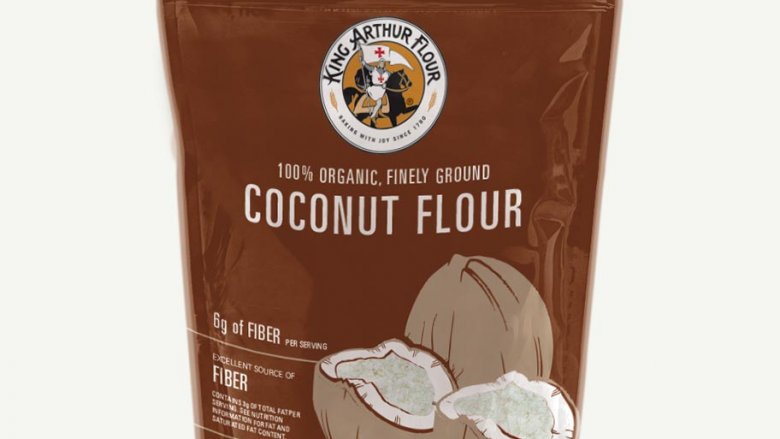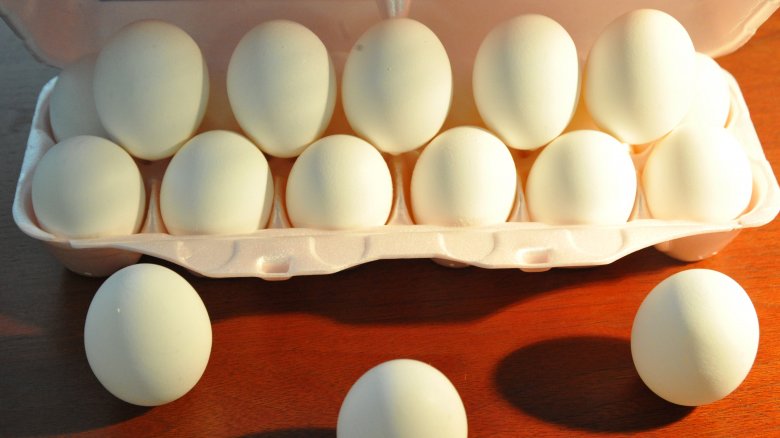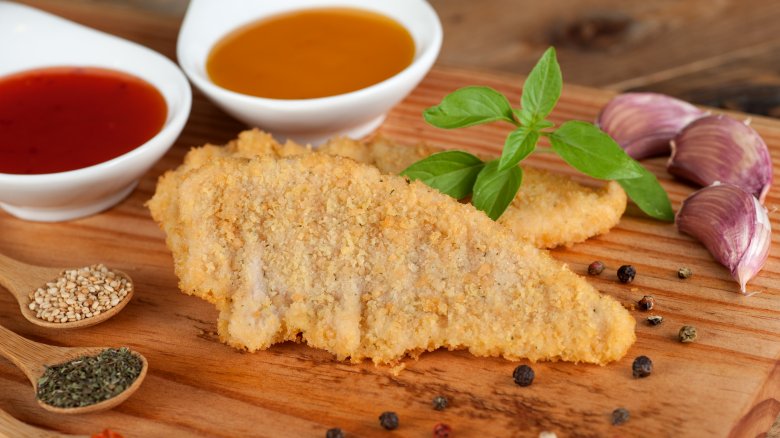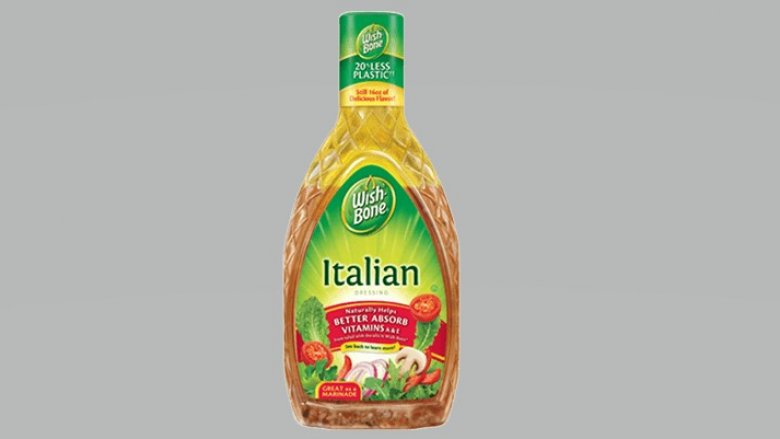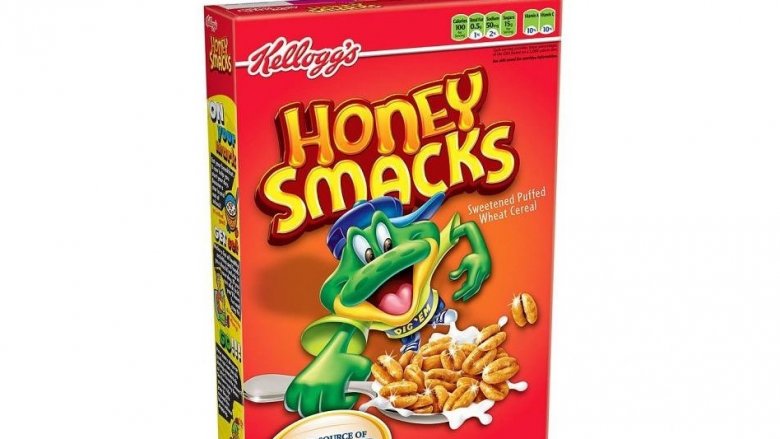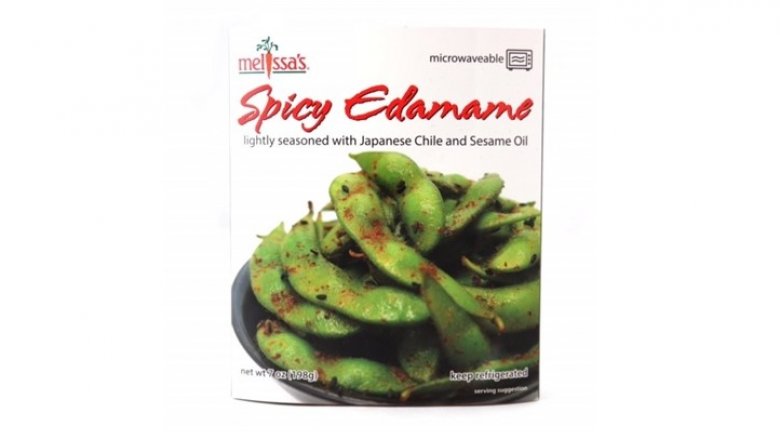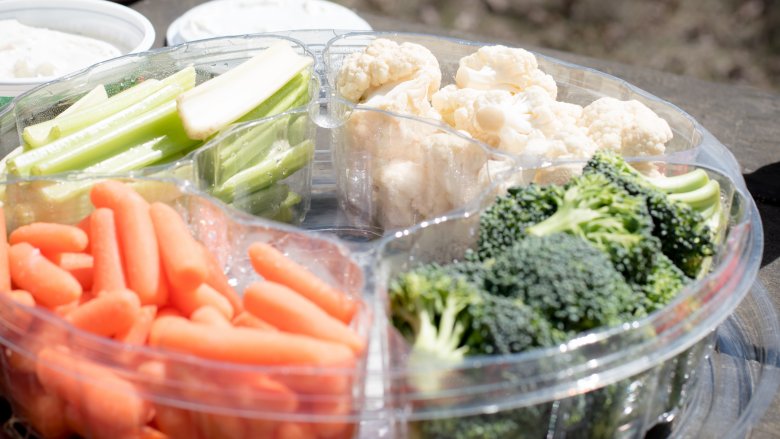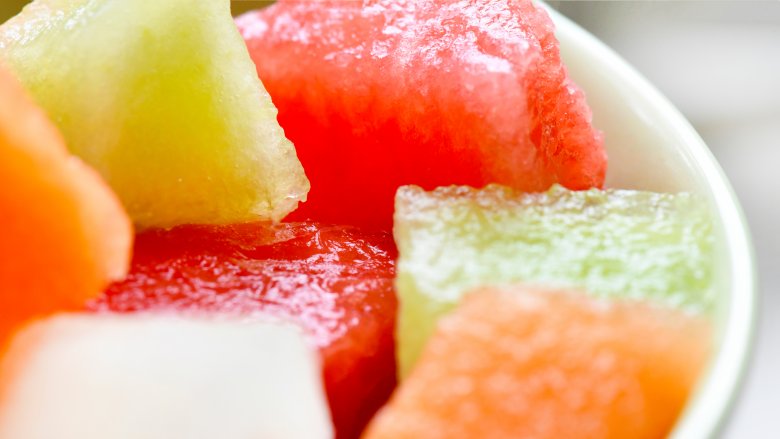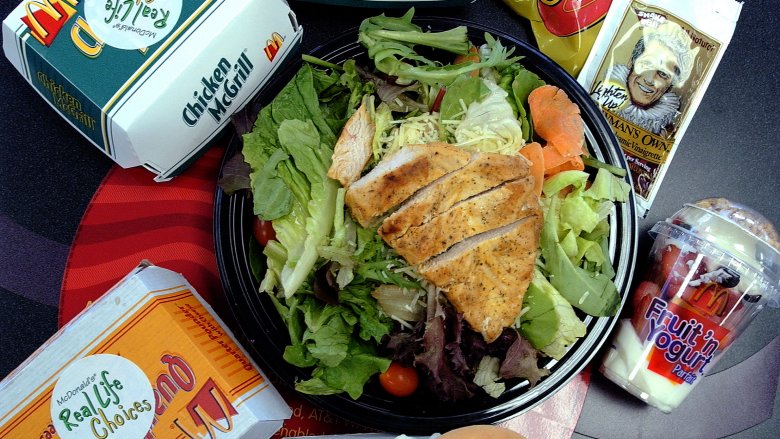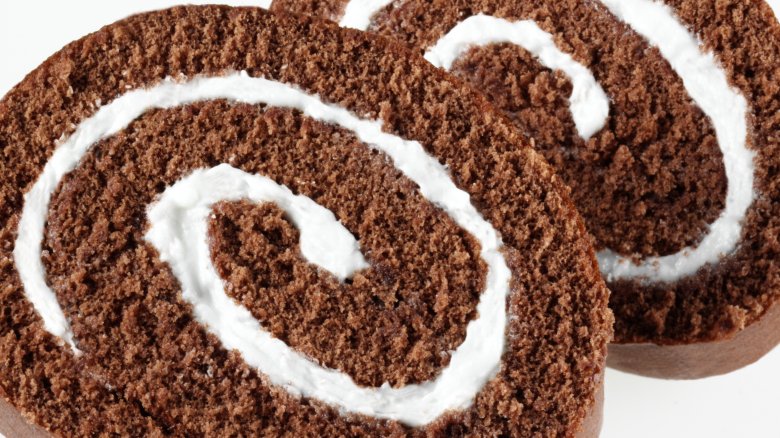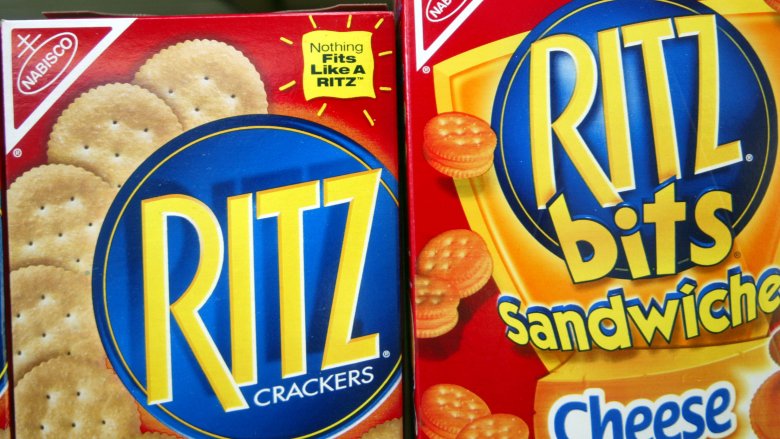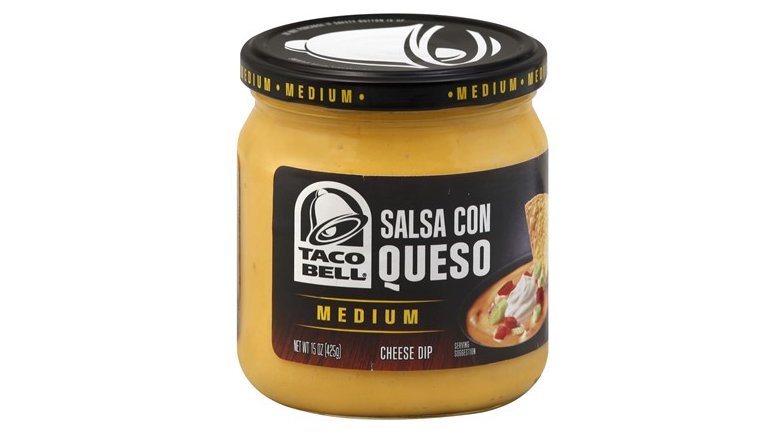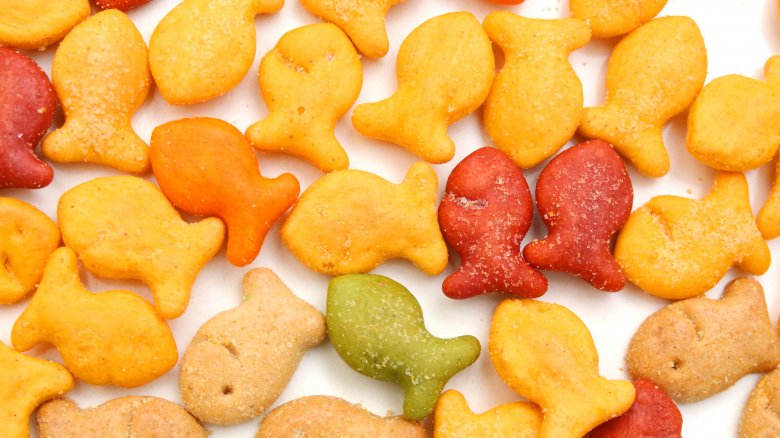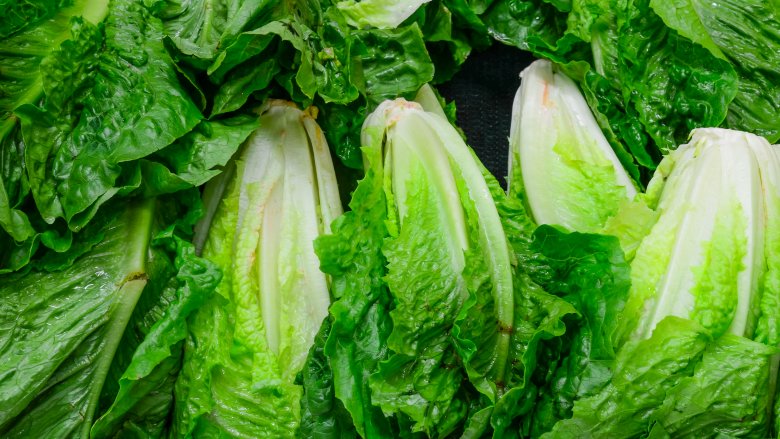The Biggest Food Recalls Of 2018
It seems like nearly every day there's a new food recall on the news. That can be alarming, but fortunately, the Centers for Disease Control and Prevention, the Food and Drug Administration, and the US Department of Agriculture are all working together to keep everyone safe.
According to CNBC, there has been a pretty shocking increase in the number of food recalls in the last decade. They say it's not because our food is becoming more dangerous, it's just because we're better equipped to head potential outbreaks off before they become a widespread problem. It still happens, of course, and when it does, it can be deadly.
That's why it's important to keep an eye out for news of outbreaks and recalls, and to make sure you're not keeping any recalled products around your kitchen. So, let's recap some of the biggest items that have been on the CDC's danger list this year, so you know what foods to steer clear of.
Panera Bread cream cheese products
Listeria is a bacteria-bourne type of food poisoning the CDC warns is particularly dangerous to pregnant women and infants. It's commonly found in meat and dairy products — which is why it's not a complete anomaly that it was found in Panera Bread's cream cheese products early in the year. Routine testing had uncovered a single 2-ounce sample that contained the dangerous bacteria, but that was enough for Panera to issue a major recall.
Time reported on a recall issued in January 2018, and said manufacturers had pinpointed the problem. Contamination had occurred on only a single production day, and consumers were warned not to use either 2- or 8-ounce products with expiration dates on or before March 2, 2018. That meant Panera was recalling all their cream cheese products currently on shelves in their bakery cafes across the country, and that's a huge amount of cream cheese.
Frozen and dried coconut
This one is particularly important, because it involves a product you might leave hanging around in your kitchen for some time. In February 2018, the CDC issued a final update on Coconut Tree Brand frozen shredded coconut. It had been recalled after at least 27 people across nine states reported falling ill with salmonella poisoning linked to the frozen coconut.
The outbreak started in the end of 2017, and sent several people to the hospital. By February of 2018, recalled packages had been removed from distribution, but the CDC stressed consumers should still be aware of the danger that might be sitting in their kitchens.
International Harvest, Inc. also recalled one of their dried coconut products, called Go Smiles Dried Coconut Raw. It, too, was found to come with the potential of salmonella infection and the CDC also stressed that this particular kind of coconut was often shipped in bulk then repackaged and sold with other labeling, or may have even been sold to customers in bulk bins. Since you may have purchased contaminated coconut even if you don't recognize these brands, you should be extra careful.
King Arthur Organic Coconut Flour
When King Arthur's routine testing turned up a single packet of organic coconut flour containing salmonella, they issued a voluntary recall for 6,300 cases of the product. The 16-ounce packets were distributed by various outlets nationwide, and according to the FDA, consumers needed to be on the lookout for packets with "Best If Used By" dates of October 25, 2018 and December 4, 2018, with Lot No. CF22017E.
The recall came before there were any incidents linked to the contaminated flour, but it's also worth noting that the CDC says there are about 1.2 million cases of illness linked to salmonella poisoning every year. Around 450 people die from it, so it's nothing to mess around with. King Arthur also stressed that it was only products with those dates that were impacted by the recall, and other products were perfectly safe. They weren't sure where along their supply chain the problem started, but they were launching an investigation.
Rose Acre shell eggs
You've probably been told you shouldn't eat raw cookie dough because of the danger inherent in raw eggs — though many of us don't listen to those warnings. In 2018, though, the danger became very, very real.
In April, Indiana's Rose Acre Farms issued a voluntary recall of more than 206 million eggs potentially contaminated with salmonella. The FDA says the eggs were distributed across West Virginia, Virginia, South Carolina, Pennsylvania, North Carolina, New York, New Jersey, Florida, and Colorado, and at least 22 illnesses were reported by people who had eaten the eggs.
Consumers were asked to check their cartons for a few numbers, including plant number P-1065 and Julian dates between 011 and 102. The eggs were repackaged and sold under a number of brand names, including Crystal Farms, Food Lion, Great Value, Coburn Farms, and Sunshine Farms — meaning that even if you didn't recognize the name Rose Acre, you still needed to check your eggs.
Complications from salmonella infections could include conditions as severe as arterial infections, endocarditis, and could even result in the development of arthritis. Skip the cookie dough... just for now.
Tyson Foods breaded chicken
In June, Tyson Foods issued a recall on frozen, uncooked, breaded chicken tenderloins for a pretty unsettling reason: they had been contaminated with pieces of blue and clear plastics. That made the recall a Class II, which means there's a possibility consuming the contaminated meat would cause a problem. (For a comparison, Class I means there's definitely a risk of serious health issues or death, while Class III means it's pretty harmless.)
According to the USDA, the recalled products could be identified by the number "P-746" on the packaging. Before you head to the freezer to check and see whether or not that applies to anything you have, you shouldn't worry. It doesn't — those products were only distributed to food services establishments across the nation. That said, it's still worth knowing about. While you're not going to be serving any plastic-flavored chicken in your own kitchen, a little bit of knowledge goes a long way, and if there's any local lunch joint you have questions about, skip the chicken.
Wish-Bone Italian Dressing
Not all food recalls happen because there's a possibility for food poisoning, and in June Wish-Bone issued a voluntary recall on 7,768 cases of 15-ounce bottles of Italian dressing. The problem? They contained egg and milk that weren't declared on the bottles due to a labeling mistake. The only danger was to those who suffer from milk and egg allergies, but for those people, it was potentially life-threatening. Both foods are on the FDA's list of major food allergens, and as of 2004 manufacturers are required to disclose those major allergens on all package labels.
Fortunately, ABC Action News says there were no reported sicknesses resulting from customers unknowingly consuming the salad dressing and its allergens, and they also tell consumers exactly what bottles to look out for. Anything with a "Best If Used By" date of January 13, 2019 was incorrectly labeled, does contain these allergens, and is covered under the recall.
Kellogg's Honey Smacks
While many recalls happen before consumers get sick, they're not all caught in time. In mid-June, Kellogg's and the CDC announced a recall on Honey Smacks, as it had been linked to a salmonella outbreak that crossed numerous state lines.
At least 100 people from at 33 states fell ill after eating the contaminated cereal, and it's severe enough that the CDC warned consumers not to continue eating the cereal even if they were halfway through a box and everything seemed fine. They also asked anyone who stored their cereal in an airtight container to throw it out if they couldn't remember the brand but it might be Honey Smacks, and stressed that it was all sizes and best-by dates that could be contaminated. Stores, distributors, and restaurants were also warned, and at the time of the warning, 30 people had gotten so sick they ended up in the hospital. The contamination was confirmed after the warning, and matching salmonella strains were found in boxes in Montana, New York, Utah, and California.
Melissa's Spicy Edamame
June was a bad month for World Variety Produce, Inc. as well, and that's when they issued a recall on Melissa's Spicy Edamame packets. The problem was a potentially life-threatening one, and according to the FDA, it started with a mix-up at the source. The wrong spice packet was included in the edamame mix and unfortunately, it was one that contained oyster extract. Though oyster is considered a mollusk variety of shellfish and does not fall into the crustacea category that causes most severe reactions, it may still need to be avoided by some people with shellfish allergies.
The recall was completely voluntary, and the packets containing shellfish could be identified by the "Best Used By" dates on the packet. Anything dated between May 29 and July 2, 2018, contained the wrong spice packet, and the manufacturer instructed consumers to dispose of the product.
Del Monte vegetable trays
The tragedy of this one is that when you buy a vegetable tray, it's probably going to be eaten pretty quickly. It's not going to hang around in your pantry like dried coconut might, so when the FDA announced Del Monte was recalling a series of veggie trays in June 2018, it's likely a number of them had already been consumed.
The veggie trays — which included baby carrots, cauliflower, broccoli, and dill dip — were sold by retailers across six Midwestern states. They were packaged in the normal clear packaging, in 6-, 12-, and 28-ounce sizes, sported "Best If Enjoyed By" dates of June 17, 2018 and earlier, and were possibly contaminated with the cyclospora parasite. The resulting illness was mainly gastrointestinal distress of a fairly mild variety (as far as food poisoning is concerned), and fortunately, most cases of this particular infection aren't life-threatening. It will, however, ruin any picnic.
Pre-cut melon
Long, hot summer days almost require a certain kind of snack, and melon is pretty much perfect. But throughout June and July, the CDC warned consumers against picking up pre-cut melon. Fruit supplied to numerous distributors by Caito Foods, LLC in Indianapolis had been contaminated with salmonella, and at least 36 people were hospitalized by the time the outbreak was deemed officially over on July 26.
Nine states had stores that received the contaminated melon, and the CDC stressed not only was it vital that consumers not eat the fruit, but that they take extra precautions when it came to cleaning and sanitizing refrigerator shelves and drawers the melon was stored in and on.
There was a wide variety of pre-cut fruit customers were warned against eating, including watermelon, cantaloupe, honeydew, and melon medleys, particularly those sold at outlets like Walmart, Trader Joe's, Kroger, Walgreens, Whole Foods, and Costco (via the FDA).
McDonald's salads
Ordering salad might seem like the healthy, responsible thing to do when you're trying to grab lunch on a time crunch, but that's not always the case. In July, McDonald's salads were making headlines not because of their calorie and fat content, but because the fast food giant pulled thousands of them from Midwestern locations after they were linked to sicknesses stemming from the cyclosporiasis parasite.
Dozens of people fell ill and some were hospitalized because of the contaminated salads, Newsweek reported, and also added that not everyone who ate the salads came down with the severe gastrointestinal distress that indicated a full-blown infection. McDonald's official statement revealed the recall involved around 3,000 restaurants in 14 states, and it had ultimately stemmed from a problem with their lettuce supplier. They added that since they had switched suppliers and only sent out salads with the new lettuce blend, the potential for infection had passed and it was once again safe to pick up a salad from McD's for lunch.
Swiss Rolls
Who doesn't love a Swiss Roll? They're a delicious treat when you want something chocolately but not too heavy, but in July 2018, Swiss Roll manufacturer Flower Foods went public with a recall warning consumers they might be getting something else with their chocolate fix: salmonella.
These particular Swiss Rolls are sold at stores including Walmart, H-E-B, and Food Lion, and according to Business Insider, the salmonella outbreak was traced back to a supplier. That means this one gets a little complicated, as they're sold under a handful of names: Mrs. Freshley's, Baker's Treat, Great Value, Market Square, and as Food Lion and H-E-B-branded goodies. Along with the Swiss Rolls, they were also recalling Captain John Derst's Old Fashioned Bread from stores across the south. The recall was, at the time, precautionary, and there were no reported illness stemming from consuming contaminated products. It's better safe than sorry, especially considering children are particularly vulnerable to feeling the worst effects of salmonella poisoning.
Ritz Crackers
In July, Business Insider reported that Ritz's parent company, Mondelez, was recalling a series of products because of possible salmonella contamination. The list was lengthy, and included Ritz Bits Cheese and most varieties of Ritz Cheese Cracker Sandwiches. They stressed that it was merely a precautionary measure, and while no illnesses had been definitely linked to Ritz Crackers, they were still advising customers nationwide to get rid of any product they had recently purchased.
The problem wasn't linked to the Ritz factory itself, but was caused by another recall. One of Ritz's suppliers had recalled the whey powder used in the crackers because of possible contamination, and it had the potential to be a big deal. While most people recover quickly from salmonella-based food poisoning, young children — like those who might have Ritz Cracker Sandwiches as a staple food in their lunch boxes — are particularly vulnerable. Cases have been fatal, and Mondelez decided to err on the side of caution.
Taco Bell cheese dip
No one can deny that Taco Bell's weirdly, unnaturally-colored nacho cheese is one of the best things about eating there, so it was super exciting when consumers got the option to buy it at the grocery store in jar form. In 2018, though, those cheese dreams turned a bit sour when CNN reported around 7,000 cases of Taco Bell Salsa Con Queso Mild Cheese Dip were being recalled because of possible contamination with the bacteria that causes botulism.
They added there were no cases linked to the product, but that if anyone suspected they might have been poisoned, botulism is nothing to mess around with. They asked consumers to seek immediate medical attention if they experienced any symptoms, like difficulty speaking and swallowing, dizziness, and muscle paralysis.
As for the cheese, the recall covered 15-ounce jars with "Best When Used By" dates between December 27, 2018, and January 23, 2019. Manufacturer Kraft Heinz Foods Company added jars containing cheese that separated were likely contaminated, and stressed that even normal-looking cheese shouldn't be consumed.
Goldfish crackers
Goldfish crackers are a brilliant snack no matter what your age, but in the end of July, Pepperidge Farm started recalling these fun and tasty treats.
According to CBS News, the problem wasn't with their manufacturing process but with a supplier, who had notified them the whey powders used in Goldfish seasoning mixes had possibly been contaminated with salmonella. The recall included a range of flavors and size varieties, including Flavor Blasted Xtra Cheddar, Flavor Blasted Sour Cream & Onion, Goldfish Baked with Whole Grain Xtra Cheddar, Goldfish Mix Xtra Cheddar + Pretzel, and some variety packs. No illnesses were linked to the crackers, and Pepperidge Farm stressed that it was only the Goldfish crackers and not their other products that were potentially impacted. They added that customers who had purchased the products — which were distributed across the country — could return them to retailers for a refund, with the idea that a pound of prevention is worth an ounce of cure.
Romaine lettuce
If there was ever a year to avoid romaine lettuce, 2018 was it. By June, the CDC was reporting hundreds of people had fallen ill after eating romaine contaminated with E. coli, dozens had been hospitalized (some with kidney failure), and there were at least five deaths. The culprit was ultimately traced to contaminated canal water in Yuma, Arizona — the same region where the lettuce was grown. On June 28 the CDC declared the outbreak — but not the investigation — was over.
But by August 1, CNN was reporting there were still ongoing recalls associated with romaine lettuce, but this time for a different reason. According to their report, wraps and salads sold by outlets like Trader Joe's, Walgreens, and Kroger were being recalled after a troubling chain of events. The outlet's distributor, Caito Foods, was alerted by their supplier, Fresh Express, that their supply of romaine may have been contaminated by the cyclospora parasite. Recalled products were dated for anywhere between July 15 to July 23, and the lettuce was linked to the same distributor as the McDonald's recall. This time, the contamination wasn't as potentially deadly... but it might be a good idea to stay away from romaine this year.
